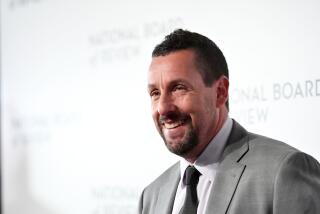Aging with grace, 3 men of letters are snapping fingers in the face of time
Time clomps by like an old horse, moving on up the road in billows of dust and transitions.
Even though it sometimes seems to pass at sonic speed, on other days we manage to slow it down enough to comprehend what’s going on in the present. This is one of those days.
In my 70s, the old horse has become a more conscious part of my life. I’m looking closely at the era I occupy and those who share it with me, before memory becomes history and everyone is gone.
I’m talking specifically about three men I know, and have had the pleasure of interviewing, who stand tall among the literati of Los Angeles. They have managed with grace and wit to snap their fingers in the face of time, mocking the old horse as he approaches in the distance.
Their names are Ray Bradbury, Norman Lloyd and Norman Corwin.
At 86, Bradbury, is the youngest of the three and still turning out books and plays as well as enthusiastically involving himself in the life of the city. He wants a monorail in L.A. almost as much as he wants to finish his next novel, and champions the cause every chance he gets.
Lloyd is 93, a legendary producer, director and actor whose friends included Charlie Chaplin and Alfred Hitchcock. The man has a memory that clicks on the names of everyone he’s ever met and exactly where he met them, and if he falters, his wife, Peg, of 71 years is there to fill in. His last movie was two years ago, and he says he’s always looking for work.
Corwin, a tall, stately man, is 97, with roots in the early days of classic radio. A writer in residence at USC, lecturer, playwright and living icon, one of his comedies will be produced in October in Thousand Oaks. Among the performers: Norman Lloyd.
All three are linked by their creative energies to one another and to us. They were all born in the early years of the 20th century, two of them before World War I. It was a different America then, on the brink of twisting into a creation that in many ways has been diminished by the passing years. In words and images, Lloyd, Corwin and Bradbury helped define it.
Lloyd talks about Chaplin and Hitchcock as if they were still down the block, and how his association with Chaplin probably called him to the attention of McCarthyism’s Communist-hunters in the 1950s. They lifted his passport and for years he dodged subpoenas to testify before the House Un-American Activities Committee, where political inquisitors performed like evil priests at an auto da fe.
Suspicions lingered as the era faded, and only Hitchcock’s insistence -- “I want him” -- convinced a network to hire him back. “I want him.” Lloyd repeats it today like the gong of a liberty bell, and I guess it was.
I sat for an hour with Bradbury. He held court in a room surrounded by books, memorabilia and honors too extensive to list here, on shelves and on the floor, a literary lion in the clutter of his lair, juggling ideas for new projects.
Like most famous men, there’s a forward thrust to the lives of these three, missions to be accomplished and goals to achieve. Corwin, whose career dates back to early radio, is the soft-spoken antithesis of hard-chargers like Bradbury and talkers like Lloyd. You have to lean forward to hear him, and like most men of accomplishment, he’d rather discuss anything but himself.
Corwin ruled the airwaves in the days when the imagination that radio provided lifted us from our Depression-era lives to the story lands he created. Bradbury calls him “the greatest director, the greatest writer and the greatest producer in the history of radio.”
In subsequent years, he wrote for film and television, winning an Oscar nomination for writing “Lust for Life,” based on a Van Gogh biography.
But his soul, I think, lies in radio, before TV images were thrust in our faces, before “reality” shows challenged good taste and credulity, before canned laughter defined humor.
Corwin turned out “We Hold These Truths” and “On a Note of Triumph,” classics that celebrated the America that was.
I grew into my own dreams while men like Bradbury, Lloyd and Corwin were already inscribing their names on a slate of history, and would build their reputations through the changing ages of a culture in flux.
Like the old horse clomping up the road, they just keep on moving toward destinations over the hilltop, leaving behind the glowing footprints of their accomplishments.
When I met with Bradbury I asked him to sign one of his books I’d brought with me. In it, he wrote one word: “Onward.” That said it all.
almtz13@aol.com
More to Read
Only good movies
Get the Indie Focus newsletter, Mark Olsen's weekly guide to the world of cinema.
You may occasionally receive promotional content from the Los Angeles Times.






